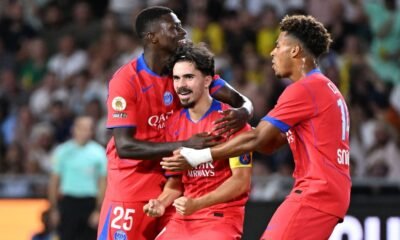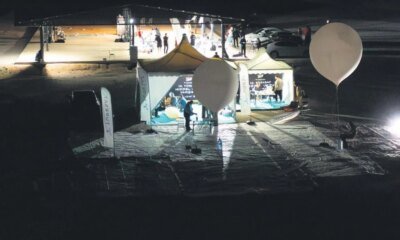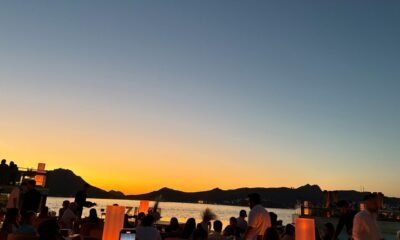Politics
Justice minister slams CHP chair over corruption probe claims
Justice Minister Yılmaz Tunç on Thursday accused Türkiye’s main opposition Republican People’s Party (CHP) of fabricating allegations to discredit ongoing corruption probes targeting the Istanbul Metropolitan Municipality and other CHP-run administrations.
Responding to claims by CHP Chair Özgür Özel that former Justice and Development Party (AK Party) official and lawyer Mücahit Birinci coerced an imprisoned businessperson into signing a false confession for $2 million (TL 80 million), Tunç said the accusations were baseless and part of a broader campaign to attack the judiciary.
“CHP headquarters has become a fabrication center for lies,” Tunç said during a televised interview. “The Public Prosecutor is obligated by law to investigate upon receiving a tip. While the crimes are evident, corruption still persists in some municipalities. These investigations were not initiated by the AK Party, but by the CHP’s own associates.”
Özel alleged at a news conference that a group he called the “AK Toroslar gang” pressured businessperson Murat Kapki, a suspect in the Istanbul Metropolitan Municipality investigation. Özel claimed Birinci visited Kapki in prison on July 31 and offered him release in exchange for signing a prepared statement and paying $2 million.
Birinci rejected the accusations on social media, calling them “nonsense” and warning Özel that “nothing will ever be the same again.”
The Istanbul Chief Public Prosecutor’s Office announced that it had launched an ex officio investigation into the alleged prison meeting, stating that developments would be disclosed as necessary.
Tunç said the CHP’s rhetoric aimed to politicize judicial proceedings and preemptively undermine corruption trials.
“Once the trial begins, the white sheep and the black sheep will be revealed,” he said. “Türkiye is a state of law, with a judicial system that holds corruption and terrorism accountable.”
The minister also criticized Özel for failing to deliver promised evidence to the Supreme Board of Judges and Prosecutors (HSK).
“A week passed and no documents or information were submitted,” Tunç said. “He says he has evidence, but when the truth comes out, the liar’s candle burns only until the night prayer.”
The corruption probe into Istanbul’s municipality is part of a widening investigation into CHP-run local governments, with prosecutors citing alleged bribery, tender rigging and links to organized crime.
Politics
Türkiye’s ruling party launches nationwide climate awareness push
Türkiye’s ruling Justice and Development Party (AK Party) announced Wednesday it will hold a “Green Transformation and Climate Awareness Program” in all 81 provinces, aiming to bring the government’s new climate legislation and long-term vision for a carbon-neutral future directly to the public.
The initiative, led by the party’s Environment and Urbanization Policies Department, will convene meetings with AK Party members, business leaders and civil society representatives. The events will focus on President Recep Tayyip Erdoğan’s climate change policies, the scope and purpose of the newly adopted Climate Law and the amendments introduced to strengthen Türkiye’s environmental governance.
In a statement, the department said the program was designed to raise awareness of the risks posed by the global climate crisis and highlight Türkiye’s commitments to reduce its emissions.
“Disasters experienced around the world have demonstrated the seriousness of climate change,” the department said. “Heat waves, droughts, floods, water scarcity and wildfires are no longer regional but global challenges. Türkiye has taken decisive and visionary steps from the beginning to confront this deepening problem.”
Officials emphasized that Türkiye’s 2053 Net Zero Emission target and Green Development Vision serve as a road map not only for environmental policy but also for broader sectors, including industry, energy, transport and agriculture.
“With the Climate Law, a holistic framework has been established to mitigate the effects of climate change and protect our natural resources,” the statement said. “This represents a significant step toward reducing carbon emissions, accelerating the transition to renewable energy and participating fully in the green economy.”
The first program will take place in Istanbul on Aug. 22, with members of the party organization gathering at the AK Party’s provincial headquarters. Similar events will follow across all other provinces in the weeks ahead.
Climate law milestone
The outreach program comes shortly after Parliament adopted Türkiye’s first-ever climate law. This sweeping measure sets a national framework for reducing emissions and introduces a new Emissions Trading System (ETS).
The law grants the Climate Change Directorate expanded authority to oversee compliance, inspect businesses and enforce penalties for violations. Companies covered by the ETS will be required to obtain greenhouse gas permits within three years of the law’s entry into force, though the directorate may extend the period by up to two years.
The AK Party’s new provincial-level program reflects an effort to ensure that the broader public understands the government’s climate policies and to build momentum behind the country’s green transformation.
Party officials said the nationwide meetings will provide an opportunity for dialogue among political leaders, local businesses and civic groups, highlighting both the risks of climate change and the opportunities created by Türkiye’s shift to renewable energy and low-carbon development.
“No artificial agenda will overshadow our progress toward peace with nature and sustainable prosperity,” the statement said.
Politics
Somali, Sudanese officials hail Türkiye’s growing ties with Africa
Turkish foreign policy toward Africa has undergone significant changes under the successive governments of the incumbent Justice and Development Party (AK Party). Under the leadership of President Recep Tayyip Erdoğan, Ankara has strengthened ties with the continent, seeking to offer an alternative partnership to countries seeking to erase the traces of a troubled colonial past.
This new “Africa opening,” as Turkish officials call it, appears to be paying off as reflected in statements of two incumbent and former ministers from Somalia and Sudan.
Abdulkadir Mohamed Nur, minister of ports and marine transport of the Republic of Somalia, says relations took a turning point with Erdoğan’s visit in 2011 in the company of his family and a delegation of ministers.
Nur told Anadolu Agency (AA) on Wednesday that the visit upgraded relations to a strategic dimension.
He stated that Somalia was in a state of collapse and was experiencing one of the worst droughts before Erdoğan’s visit.
“In those days, Somalia was cut off from the world and left without aid. When President Erdoğan visited Somalia with his Cabinet and family, it marked a significant turning point for the world. It wasn’t only the assistance of the Turkish people, but global attention also turned to Somalia (thanks to his visit).”
Emphasizing that Türkiye has never distanced itself from Somalia since Erdoğan’s visit, Nur said: “Since that day, we have continuously progressed. Türkiye has played a major role in the reconstruction of Somalia.” Nur added that Türkiye has always stood by Somalia in its fight against terrorism, in its development efforts and in improving the welfare of its people.
He mentioned that Türkiye-Somalia relations began with humanitarian aid but have now progressed to a strategic level, noting that cooperation is underway in major sectors, including oil, fisheries and even space exploration.
Nur stressed that Türkiye’s presence in Somalia brings joy not only to the Somali people but also to all friendly nations.
Recalling his time in Türkiye in 2011 as both a student and a second secretary at Somalia’s diplomatic mission there, Nur said he could never forget those days: “The Turkish people have always stood with the oppressed and continue to do so. If the Somali people have come through those dark days to where we are now, Türkiye, President Erdoğan and the Turkish people have played a significant role in that.”
Mohamed Dhuubow, director of the Somali Investment Promotion Office at the Ministry of Planning, Investment and Economic Development, commented on Erdoğan’s visits: “The 2011 visit was for humanitarian assistance, but the second visit in 2016 was a development mission.” Dhuubow stated that Türkiye’s role in Somalia has extended into investment and infrastructure.
“Significant developments have taken place in Türkiye-Somalia relations. Turkish Airlines launched flights to Mogadishu, followed by Turkish companies operating at the port and airport, which transformed Somalia’s economy. Today, numerous Turkish investors are active in sectors ranging from banking to construction,” he said.
He noted that Somalia’s new company law allows foreign investors to own property and that Turkish businesspeople have taken a pioneering role in this process.
Following Erdoğan’s 2011 visit, Türkiye’s presence in Somalia went beyond humanitarian aid.
The opening of an embassy in Mogadishu, the establishment of a Turkish Cooperation and Coordination Agency (TIKA) office, and the launch of Turkish schools and hospitals institutionalized the relationship.
Today, Somalia has become the symbolic country of Türkiye’s African initiative. Turkish companies are visible actors in Somalia’s infrastructure and daily life. The two countries are now even exploring new partnerships in energy, fisheries and even space.
Türkiye’s policies toward Africa are also admired by Sudan, according to the former foreign minister of the African country. Ali al-Sadiq told AA that Türkiye topped the list of countries that may play a key role in the reconstruction of Sudan, which is gripped by strife. “Türkiye stood by Sudan and supported displaced refugees,” he said on Wednesday.
He emphasized that Africa has long been seen as an area of economic exploitation by Western countries. “The time has come for African nations to take control of their destinies and determine their futures themselves,” he said.
Praising Türkiye’s support to many African nations, he said they expect Türkiye to expand its influence further across the continent. He emphasized that this outreach should include almost every African country, many of which need aid, expertise and higher education.
The former minister expressed Sudan’s desire to expand cooperation with Türkiye, stating that Sudan possesses vast resources in agriculture, water, mining and livestock.
He especially noted the potential benefits of Türkiye’s expertise and technology in agriculture and expressed appreciation for the opening of a Ziraat Katılım Bank branch in Port Sudan at a time when millions of Sudanese have been displaced from their homes and are living as refugees abroad.
Al-Sadiq called for the development of mechanisms to enhance Turkish-Sudanese cooperation, emphasizing the need to establish a transportation corridor between the two countries. He said that peace has been restored in nearly three-quarters of Sudan and that now is the time to begin strategic cooperation between the two countries.
Politics
Türkiye begins passport-controlled border crossings with Syria
Türkiye officially began passport-controlled border crossings with Syria on Wednesday, allowing Turkish citizens and Syrians with multiple citizenships to travel through most land gates, marking a key step in the normalization process following Syria’s liberation last December.
According to an Interior Ministry statement posted on the Turkish social media platform NSosyal, Turkish citizens and Syrian nationals who have obtained multiple citizenships will be able to enter and exit Syria through Türkiye’s land border gates, except for those located in the Operation Peace Spring Zone.
The move coincides with a significant increase in voluntary returns of Syrians from Türkiye.
The Migration Directorate reported last week that 411,649 Syrians have safely and voluntarily returned to Syria since the fall of longtime dictator Bashar Assad on Dec. 8.
Since 2016, the total number of voluntary returns has reached 1,151,652, while the number of Syrians under temporary protection in Türkiye currently stands at 2,543,711.
Türkiye has been home to millions of Syrian refugees since the civil war broke out in that country in 2011. When the Assad regime collapsed due to an opposition push last December, refugees started eyeing quick returns. Türkiye eased restrictions on its border crossings with its southern neighbor after the fall of the regime, but the number of returnees initially fluctuated between 1,300 and 1,400 people daily.
Authorities were expecting a surge in returns when the schools started their summer recess in June, and the projections proved true. After June 20, daily crossings reached 2,500.
At one point, numbers receded due to the Iran-Israel conflict that threatened to push the region into another episode of turmoil, but following a fragile cease-fire between the two countries, crossings increased again.
The border gates have a capacity that allows for the crossing of 3,000 people daily, as they undergo comprehensive checks before traveling into Syria.
Türkiye expects more Syrians will return home in the coming months, near the end of summer, with the return of Syrians working as seasonal laborers in fields and orchards across Türkiye, from Mersin and Antalya to provinces of Burdur and Isparta.
Voluntary returns are closely coordinated by the Migration Directorate and relevant institutions, with every step, from registration to transportation planning, handled by authorities.
Syrians wishing to return can schedule appointments through the provincial directorate of migration management in their city of residence via the website randevu.goc.gov.tr. Applicants receive a voluntary return form, a travel permit to the departure city, and, if necessary, a letter of consent.
Once documents are completed, returnees proceed to the Voluntary Return Coordination Centers and board buses to the land border crossings in Hatay’s Cilvegözü, Yayladağı, Zeytindalı, Kilis’ Öncüpınar, Çobanbey, Gaziantep’s Karkamış and Şanlıurfa’s Akçakale districts.
Syrian children are carefully processed, provided with gifts and allowed to cross after fingerprinting and customs checks. Returns are also monitored by the United Nations High Commissioner for Refugees (UNHCR) to ensure safety and compliance.
Bashar Assad, Syria’s leader for nearly 25 years, fled to Russia on Dec. 8, ending the Baath Party regime, which had been in power since 1963. A new transitional administration led by interim President Ahmad al-Sharaa was formed in January.
Politics
Terror-free Türkiye committee meets victims of PKK violence
The next session of the National Solidarity, Brotherhood and Democracy Committee of the Parliament will be convened on Tuesday in Ankara. The committee, which aims to move forward with the terror-free Türkiye initiative involving disarmament of the terrorist group PKK, had a significant group of guests: families of people killed in PKK attacks and veterans of security forces maimed in counterterrorism operations and attacks. This fourth session of the committee differed from earlier ones in that civilians, as well as nongovernmental actors involved in the initiative, were given a voice. Minister of Family and Social Services Mahinur Özdemir Göktaş also attended the committee’s meeting.
Assuring the families that suffered most from the PKK is key for officials overseeing the process, as opponents of the initiative propagandize that the state bargained with the PKK for disarmament and brand it as a betrayal of those families and veterans.
Addressing the opening of the new session, Parliamentary Speaker Numan Kurtulmuş once again reiterated that Türkiye did not negotiate with the PKK to convince it to lay down arms and will not, in the future. He also warned that certain circles might attempt to undermine the process.
Kurtulmuş said Türkiye owed “each martyr and their families” and hailed how resilient they had been, as well as how proud they had been of their sacrifices. Since the 1980s, the PKK has killed thousands of people, particularly in southeastern Türkiye, in terror attacks targeting security personnel as well as civilians. At the height of its campaign in the 1990s, the terrorist group often ambushed soldiers in mountainous territories in the southeast and, despite intensified counterterrorism operations, continued its attacks well into the early 2000s. Its attacks relatively decreased after the capture of its leader, Abdullah Öcalan, in 1999, but it remained a significant threat to the country.
The speaker stated that Türkiye never offered anything to the PKK in return for disarmament, adding that Parliament would also not be involved in any bargain. “We will merely fulfill our responsibility to cement our lasting brotherhood,” he said, referring to the underlying theme of the initiative. The PKK always exploited the underprivileged Kurdish community and claimed to fight for Kurdish self-rule, while the state, which staunchly ignored Kurdish identity during the early years of violence, eventually started highlighting this aspect of the issue. Officials hope that stronger ethnic ties may trump the PKK’s separatist agenda. “We are going through a difficult process, but we will talk about every matter here,” Kurtulmuş said, highlighting the “historic mission” of the committee.
“We have to be careful about attempts to undermine this process, either here in our country or through intervention from abroad,” Kurtulmuş added.
After hearing from families of victims and veterans, the committee is expected to hold another session on Wednesday for families of PKK members. Three informal groups, calling themselves the Diyarbakır Mothers, the Saturday Mothers and the Peace Mothers, will meet with the lawmakers.
All have a relative, mostly sons and daughters, who were either tricked into joining the PKK or victims of extrajudicial killings targeting people with alleged ties to the group and all are known for their perennial protests. The Peace Mothers stand out among them as it is comprised of women whose children volunteered to join the PKK, and they advocate what they call “peace” between the state and the terrorist group.
The PKK last month literally burned weapons in a highly symbolic ceremony in northern Iraq as the first concrete phase of disarmament and is expected to abandon arms by the end of 2025 entirely. The initiative will then move on to a discussion on the status of the group, as cessation of acts of terrorism will pave the way for a new future for the PKK. This “future” will likely involve integrating the group’s members into a new life, either in Türkiye or abroad, and the committee aims to establish a legal framework for this new process.
The committee first convened on Aug. 8 with the participation of lawmakers from most parties, including the ruling Justice and Development Party (AK Party), its ally Nationalist Movement Party (MHP), the main opposition Republican People’s Party (CHP) and the Peoples’ Equality and Democracy Party (DEM Party), a key actor in the initiative due to its intricate links to the terrorist group. The opposition Good Party (IP) abstained from joining the committee. The IP is among several small parties opposing the initiative.
Although it is not authorized to draft bills, the committee will issue recommendations to Parliament, which may subsequently discuss and adopt them as bills.
The committee is expected to wrap up work by the end of this year, though this may be extended based on developments.
Politics
Erdoğan marks World Humanitarian Day with call for global compassion
President Recep Tayyip Erdoğan used the occasion of World Humanitarian Day on Tuesday to call for stronger international solidarity in the face of global crises, urging nations to embrace “compassion beyond borders” in an article published in Spain’s El Pais.
In the piece, titled “Compassion Beyond Borders: The Alliance of Civilizations and Humanitarian Diplomacy,” Erdoğan argued that peace, security and prosperity can only be achieved through cooperation built on justice and respect.
He underscored the long-standing friendship between Türkiye and Spain, describing the two nations as “standing at the two poles of the Mediterranean” and sharing common goals in trade, energy, defense and diplomacy.
“Spain stands among our most reliable allies within NATO,” Erdoğan wrote, citing Madrid’s deployment of a Patriot air defense system in Türkiye’s southern Adana province.
He also thanked Spain for supporting Türkiye’s European Union accession bid and recalled the solidarity shown after the Feb. 6, 2023, earthquakes, when Spanish rescue teams and medical staff provided emergency aid.
Humanitarian emphasis
Framing Türkiye as one of the world’s most generous nations relative to its economic size, Erdoğan highlighted Ankara’s humanitarian diplomacy, which he said reaches across regions from Gaza to Sudan, Somalia to Bangladesh and as far as Latin America. He noted Türkiye’s hosting of the first-ever U.N. World Humanitarian Summit in Istanbul in 2016 as a milestone in shaping the global aid agenda.
According to Erdoğan, Turkish aid agencies, such as the Disaster and Emergency Management Presidency (AFAD), the Turkish Cooperation and Coordination Agency (TIKA), the Red Crescent and religious foundations, provide assistance not only during emergencies but also through long-term development projects.
He pointed to Türkiye’s “Goodness Trains,” which supply food and medicine to Afghanistan, field hospitals serving Rohingya refugees in Bangladesh, agricultural projects in Sudan and widespread COVID-19 vaccine donations to more than 160 countries.
“Humanitarian aid is the most advanced form of diplomacy,” Erdoğan said, adding that Türkiye’s outreach aims to safeguard human dignity and offer “a voice to the conscience of humanity.”
The president also condemned the ongoing humanitarian crisis in Gaza, citing what he described as Israel’s “inhumane” blockade and military operations. He said Türkiye has provided more than 101,000 tons of aid to Palestinians and will continue supporting international relief efforts.
Türkiye-Spain cooperation
Erdoğan emphasized the symbolic importance of publishing his article in El Pais, noting that this year marks the 20th anniversary of the Alliance of Civilizations, a joint Turkish-Spanish initiative launched under the U.N. framework to foster intercultural dialogue.
He argued that the shared humanitarian traditions of Türkiye and Spain offer hope in an era of war, famine, forced migration and climate disasters. “The spirit of solidarity unites the two peoples in a profound bond that transcends geographical boundaries,” he wrote.
Despite global geopolitical tensions, Erdoğan pledged that Türkiye will persist in humanitarian outreach. “For humanitarian aid transcends political considerations,” he concluded, “it is fundamentally a matter of conscience.”
Politics
Turkish, Japanese defense ministers discuss cooperation
Seeking to build on their longstanding relations, Türkiye and Japan eye cooperation on defense.
Japanese Defense Minister Gen Nakatani met his Turkish counterpart, Yaşar Güler, in Ankara on Tuesday for talks on defense industry cooperation, including the possible supply of Turkish-made drones, as Tokyo expands the role of unmanned systems in its armed forces.
Nakatani is the first Japanese defense minister to make such an official trip to Türkiye. This NATO member country is keen to expand its economic and other ties beyond Europe and the Middle East. Türkiye and Japan are both U.S. allies.
Nakatani and Güler are expected to “discuss ways to expand cooperation on defense equipment and technology and exchange views on regional developments,” a diplomatic source in Ankara said.
They also aim to increase contacts between the Turkish Armed Forces (TSK) and Japan’s Self-Defense Forces at the unit level, the source added. Nakatani is also scheduled to visit Istanbul on Wednesday.
Turkish and Japanese defense ministries did not immediately respond to requests for comment.
During the visit, Nakatani will tour Turkish defense companies and facilities, including Turkish Aerospace Industries (TAI), navy shipyards, and drone maker Baykar, according to a Defense Ministry source.
“Apart from general matters, defense industry cooperation will be on the agenda … They will hold inspections regarding drones, but an agreement is not expected. It is too early for an agreement,” the Defense Ministry source said.
Turkish firms have supplied drones to several countries, including Ukraine, while Japan is preparing to expand the use of uncrewed aerial vehicles across its ground, air and naval forces.
Japan is considering Turkish drones as one of the potential options for this effort, a diplomatic source said. Nakatani’s visit to Türkiye is part of a regional tour from Aug. 17 to Aug. 22, which also includes stops in Djibouti and Jordan.
-

 Economy2 days ago
Economy2 days agoTürkiye’s housing market sees lowest price increase in year
-

 Sports2 days ago
Sports2 days agoPSG win to open Ligue 1 campaign, Espanyol stun Atleti in La Liga
-

 Economy2 days ago
Economy2 days agoTürkiye moves to final stage before 5G rollout
-

 Daily Agenda2 days ago
Daily Agenda2 days agoModel satellite of young people opened the doors of space
-

 Sports2 days ago
Sports2 days agoScheffler rallies to win 5th PGA Tour of year at BMW Championship
-

 Lifestyle2 days ago
Lifestyle2 days agoGolden hour gems: Best sunset spots in Türkiye’s Bodrum
-

 Daily Agenda3 days ago
Daily Agenda3 days agoMarmara is not ready for new earthquakes
-

 Sports2 days ago
Sports2 days agoArdent Arsenal edge Man Utd, Palace draw dampens Chelsea mood




